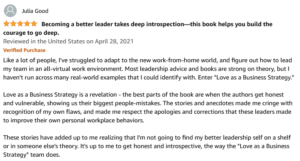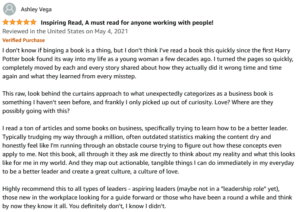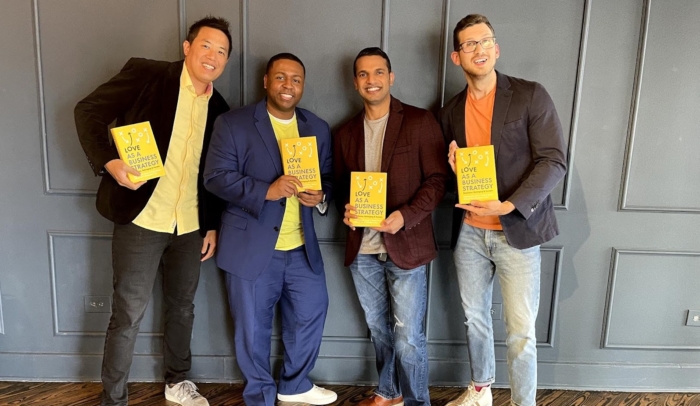When Mohammad Anwar was 20 years old, he started a technology company. His goal? To become a successful businessman and a millionaire, even though he didn’t have a business degree. Fast forward 10 years, and Mohammad had achieved his goal.
He was living the American dream: driving fancy cars, flying fancy airplanes, and running a successful business. Everything was going great until, suddenly, it wasn’t.
When he was forced to lay some of his people off, he hit rock bottom. The pain of the experience destroyed any confidence he had left in his ability to run a business successfully.
As he was contemplating giving up, he attended a football game at his alma mater, the University of Houston. During the game, he witnessed one of the best comebacks he had ever seen: with 30 seconds remaining, his team came back from a 20-point deficit to win.
Mohammad was amazed. And when he heard the coach credit the victory to the love and support the people on the team had for each other, a light bulb went off in his head.
In a moment of introspection, he realized he didn’t love his team. He didn’t even really care about them. If he wanted his business to make a comeback, he needed to change that. He needed to instill a culture of love in his organization.
With that realization, Mohammad committed to becoming a loving, trustworthy, vulnerable leader. He was determined to create a culture of forgiveness and inclusion at his company, so that everyone who worked there would feel empowered, safe, and cared about.
Mohammad found his calling helping other companies transform their cultures.
As Mohammad focused on building a culture of love in his company, something amazing began to happen. His business started to turn around. Before he knew it, his company was not just surviving, but thriving. And then, something even more amazing happened.
At first, Mohammad resisted. He was in the business of providing technology solutions. He wasn’t in the business of helping companies change their culture. But the customer wouldn’t take no for an answer, so finally, Mohammad and his team agreed.
It was a resounding success, and Mohammad quickly realized that helping companies transform their cultures was his real purpose. So, he spun off a new company, Culture+, to do just that, and started bringing on more clients.
It wasn’t long before his clients began to approach him and tell him he needed to write a book that would encapsulate the information he shared at his trainings. The idea intrigued Mohammad: with a book, he could build awareness around his message and build credibility for himself.
But, he had his hands full running two businesses. He wasn’t sure he had the time to do it justice. Then COVID hit, and everything came to a halt. Suddenly, he had time on his hands—time he could use to write his book.
Mohammad struggled to find a publishing company who would support his vision.
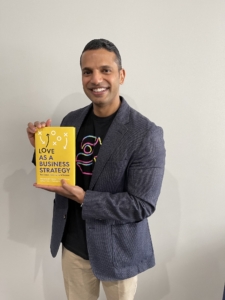
Mohammad wanted his book to be different from all the other books on culture out there. He wanted it to be a practical guide, but he also wanted it to give people hope that they could integrate their lives into their work and find joy in both. On top of that, he wanted the book to appeal to everyone in the workforce, no matter their role.
To achieve these goals, Mohammad decided to bring in additional authors: Frank Danna, Jeffrey Ma, and Christopher Pitre. With four authors, the book would include a broad range of perspectives and experiences. It was the perfect way to make sure the book appealed to anyone who picked it up.
With the right co-authors on hand to help him share his message with the world, he was ready to get started. There was just one problem.
Mohammad and his co-authors knew that, if they wanted the book to be successful, they needed to enlist the help of experts. So, they started calling different publishing companies.
Over and over, they heard the same answer: No.
Where Mohammad saw the benefits that four authors would bring, the companies he talked to saw risk. With so many cooks in the kitchen, the companies worried the project would take too long (if it got done at all). Mohammad wasn’t willing to budge, though—he knew that the book needed all four of them. He also knew they needed expert help, or the book would be doomed before they had written a single word.
In Scribe, Mohammad found a partner willing to help him create the book he was dreaming of.
Just when it began to feel like all hope was lost, Mohammad set up a call with Rikki Jump, Head of Author Strategy at Scribe. Like everyone else, Rikki warned him that working with four authors could be difficult. However, unlike everyone else, Rikki told him that Scribe was willing to try it.
Cautiously optimistic, Mohammad told Rikki that he wanted to get the book out in nine months. Rikki’s response? If Mohammad and his co-authors were willing to show up and commit to the process, then Scribe would step up and help them achieve all their goals.
Mohammad was elated, and as the conversation continued, he realized that the people at Scribe might be the experts they had been searching for so desperately. The clincher was when he realized how closely Scribe’s culture aligned with their own.
Still, after all the warnings and caveats he had heard from other companies—and even from Rikki—about the challenges of working with four co-authors, Mohammad wasn’t completely confident that Scribe could help them create a cohesive book. And, even if they could, would they be able to complete it in his desired timeframe?
He discussed it more with Rikki, who promised him that, if he and his co-authors pushed hard and stayed committed, Scribe would do whatever it took to get them across the finish line. Relieved by her assurances and willing to take a leap of faith, Mohammad signed up for Scribe’s Professional Package.
With Scribe’s support, Mohammad and his co-authors were able to achieve their goals.
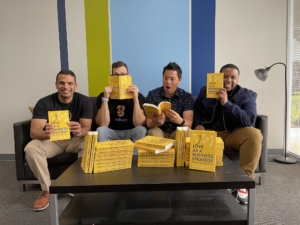
Mohammad and his co-authors started working with their scribe, Chas Hoppe, and were immediately impressed.
It was clear to them all that the team at Scribe, particularly Chas, felt the same drive to achieve their common goal: produce a high quality book, and do it quickly. That level of support was amazing, and it enabled them to keep pushing forward.
Of course, it wasn’t always smooth sailing. But seeing the way their team responded to challenges and difficulties—working to come up with solutions instead of getting defensive—built Mohammad’s trust and confidence in Scribe even more. It was clear the culture really was all about honesty, love, and support.
As he and his co-authors worked through the writing, editing, and publishing processes, that never changed. The people at Scribe were committed to taking care of them, supporting them, and addressing any issues that came up. And, in the end, that commitment resulted in them hitting their nine-month goal.
Mohammad and his co-authors were elated. Just like Rikki had promised, Scribe had lived up to their end of the bargain and helped them bring their vision to reality.
The book established Mohammad as a leader in transforming company culture.
When Love as a Business Strategy launched in April of 2021, it was immediately clear that all the people who had been telling Mohammad that the world needed to hear his message were right. In fact, people were so hungry for its message that, in the first month alone, it exceeded the sales goal Mohammad and his team had set for it by more than 350 percent.
The team was ecstatic at how well the book was selling and Mohammad was also thrilled by how well the book established him as a leader in the culture-as-a-service space. Since the book published, leaders of organizations from more than 46 different countries have now hired him and his team to teach them how to implement love as a business strategy.
And this new momentum shows no signs of slowing down. Leaders continue to regularly reach out and ask Mohammad and his team to come and speak at their organizations—and in almost every instance, they mention the book when they are setting up the engagement. That’s vitally important to Mohammad, because many organizations become ongoing clients after they hear him and his team speak.
In fact, for Mohammad, landing speaking engagements that turn into business opportunities is crucial. And in this, too, the book has helped him and his team smash their goals. This year, for example, they set a goal of booking 12 speaking engagements for the entire year.
Before Love as a Business Strategy launched, it might have taken them months to reach this goal. Now, though? Only six weeks into the year, they had already booked 18 speaking engagements, and more opportunities are coming in all the time.
When Mohammad considers the lifetime value of all the customers the book has brought in, he’s confident that his initial investment will be surpassed 100X.
Mohammad’s book is spreading his message of love throughout the world.
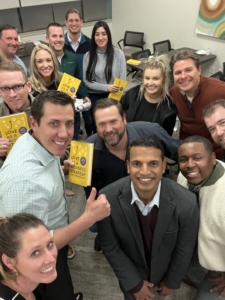
As happy as he is about the positive impact the book has had on his business, though, Mohammad’s real joy comes from knowing he’s made a difference in people’s lives.
Over and over, people reach out to tell him that the book is giving them hope. They tell him that the stories in the book prove to them they can control their own destinies and help bring love to their workplaces.
Every time he gets these messages, he gets goosebumps, because they prove he’s managed to spread his message of love a little further into the world. For him, there could be no greater reward, because he knows firsthand how important a culture of love is.
It’s what saved his business after his own toxicity almost drove it into the ground. It’s what’s enabled his clients to turn their own organizations around. And he knows it can do the same for every other business in the world.
Here are a few more people whose lives have been impacted by Love as a Business Strategy.
